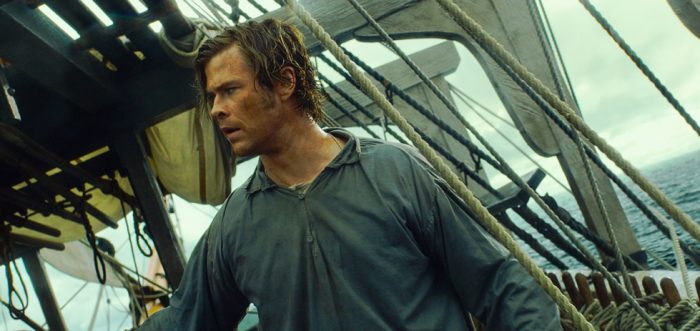
The unwieldy title of In the Heart of the Sea is just the beginning of its woes as an anodyne survival saga from Ron Howard, a director who has made anodyne sagas his specialty. As part of a spate of films that elicit the sum-total intrigue of a Wikipedia article at several times the cost (including A Beautiful Mind, Frost/Nixon and Rush), he pores over his soundstage retellings with placid digital zooms and cutaways in desperate efforts to create movement where there is none. The same holds true when he swaps to blue screens and ocean tanks for the story behind the story of Moby-Dick, wherein a lowly whaling ship Essex runs afoul of a big sperm whale and leaves its crew, headed by Chris Hemsworth as first officer Owen Chase, stranded both at sea and in the vagaries of a plot without a coherent emotional centre.
Howard previously had Hemsworth turn his dashing looks and bouncing grin into the hallmarks of an over-zealous womaniser in Rush, but Chase is a much more stolid and typical turn. One could assume that his alpha-male proficiency is in line with the framing device, in which Thomas Nickerson (Brendan Gleeson) is made by future Dick author Herman Melville (Ben Whishaw) and his long-suffering wife (Game of Thrones‘ Michelle Fairley) to unpack his emotional baggage over a single stormy night, and retell the traumatic events of 1820 that he witnessed as an impressionable cabin boy (Tom Holland). Where this unravels is when Charles Leavitt’s script (an adaptation of Nathan Philbrick’s non-fictional account) follows and effectively elects Chase as the protagonist, which fritters away the notion of seeing Nickerson’s subjective point of view and defeats the purpose of staging this fictional meeting between him and Melville in the first place.1
Having not dropped the ball so much as blithely tossed it away, the movie wastes little time in presenting the stakes, blatant and threadbare as they are in the Howard tradition: after this one last voyage to harvest whale oil for street lamps, Chase has been promised command of his own ship to provide both for his family and his adventurous soul. This is supposedly why he braves the onslaught of Mother Nature, but the trailer oddly does a better job at presenting this motive than the end result. Hence, even when watching him go for languishing broke in their scenes adrift at sea, we know paltry little beyond the initial declarative shorthands.
The gold standard of modern, 1800s-set seafaring drama is Peter Weir’s Master and Commander, but it would be wrong to expect Hemsworth’s bouncing grin to have inferences as powerful as Russell Crowe’s lidless smile, which comes to expose a man buckling under the weight of his own myth. What’s more rational is for the former’s exploits to display the same sense of wearying time spent on the ocean as that which caused Lucky Jack to call his vessel a “little wooden world”, and for the crew around him to revel in fellowship from both that and their harrowing experience.
There’s next to nothing of the kind to be found: Chase’s conflicts with captain George Pollard (Benjamin Walker, last seen hunting vampires as Abraham Lincoln) amount to mere bickering, Cillian Murphy is largely sidelined as second mate Matthew Joy – a crying shame since he gives the most impressive performance of the film, probably truncated by editing – and the rest of the crew are left all but anonymous, save for a subplot where Pollard’s tetchy cousin Owen (Frank Dillane) sheds his lily-livered disposition as the crew face disaster. Howard and co. are so keen to show off their wearying naval set pieces and checklist of survival story beats that they neglect to give either Chase or Nickerson an arc, with Nickerson still addressing him with meek formality even in their final moments together.2 Contrary to the earnest marketing, there is only the facsimile of change in these men.
I suppose I should talk about the whale. All plot complication and no earned symbolism, its appearances come replete in explosive CGI, drenched in a saturating colour grade that saps the life from the frame. Combined with the skinflint characterisation, there is confoundingly little registered whenever someone is swept overboard either by its heaving bulk or the barge splintering so bombastically underneath it. It also presents a telling contradiction: the scene where they take a different whale on board and carve it for oil and meat is presented in more gruesome detail than the cannibalism the crew members resort to later on, which is the exact kind of bewildering inversion of common sense required to appease the MPAA.3 True to his trick of manufacturing a false sense of momentum by placing cameras on moving props, Howard takes us into more of the rotting carcass than what actually serves the story, yet in spite of that he leaves it to Gleeson to inform us of the human-flesh horror that comes later. This winds up a narrative cul-de-sac en route to the inevitable end, which is Melville going off into the sunset to write his seminal work of fiction, as told to us in tacky end titles last seen in The Imitation Game. There’s nary grit or insight in this adaptation, and with Howard moving on to a third hysterical Dan Brown retelling, it’s looking to stay a firm part of what one would charitably call his style. With action that varies between middling and tedious, the only winner in Hemsworth holding a harpoon aloft and starving for this Behind-the-Music tale is Hemsworth himself.
